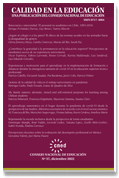The Role of Experiences and Motivation to Learn during the Implementation of Distance Learning in the COVID-19 Health Emergency among Higher Vocational Education Institutions
DOI:
https://doi.org/10.31619/caledu.n57.1226Keywords:
e-learning, higher education, vocational education, motivation to learnAbstract
The integration of digital technologies in education in the context of the pandemic has been marked by the difficulties faced by students, teachers, and families worldwide (Bonal & Gonzalez, 2020). The current research aimed to characterize the perceptions and motivations associated with the experience of emergency distance training in higher vocational education (ESTP by its initials in Spanish). We applied a battery of instruments to a sample (n=3068) of students from two higher technical-professional education institutions. The instruments applied were: the Instructional Materials Motivation Scale (IMMS); an Inventory of negative personal experiences during a pandemic (Ponce, 2021); an Inventory created for this research about external experiences of difficulties in distance education; and two open questions to explore reports of negative and positive experiences in the period of a health emergency. Among the most relevant results are that students, more than a third, have had to face difficult situations during the pandemic, such as job loss, economic stress in the family, or death of relatives or friends. The difficulties associated with motivation and mood arise in the inventories as well as in the open questions. Among the positive experiences, the stories about overcoming and achievement stand out. These results allow us to discuss the importance of socio-emotional variables within the teaching-learning processes during a health emergency in the context of technical-professional higher education.
Downloads
Published
Issue
Section
License
Authors retain their Copyright and only transfer a part of these to the journal, accepting the following conditions:
Authors keep their rights as authors and guarantee the right to the journal for the first publication of their work, which is simultaneously subject to the Creative Commons Attribution license allowing third parties to share the study accrediting the author and first publication in this journal.
Authors may adopt other non-exclusive license agreements for distribution of the version of the published work (e.g. inclusion in an institutional thematic file or publication in a monographic volume) accrediting initial publication in this journal.
Authors are allowed and recommended to share their work over the Internet (e.g. in institutional telematic files or their website) before and during the submission process, which may lead to interesting exchanges and increased citation of the published work. (See The effect of open access).

